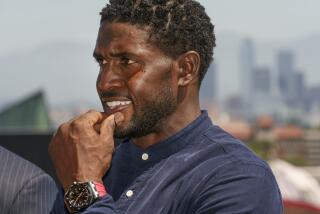Eastern Bias Clouds Heisman Race Again
- Share via
Eleven score and six years ago, our founding parents brought forth upon this Earth a new nation, and after such a chore they felt really tired, so they stayed put near the Atlantic.
Years later, they realized the land stretched some 3,000 miles to the west, but most of them had kids, thus no energy left for crossing two mountain ranges.
And so years after that, Western college football teams lacked for regard amid an Eastern bias of non-sinister origins. More people lived in Eastern-Central time zones than in Mountain-Pacific; people are strange beings who tout nearby athletes; and the East, still tired from founding the country, often nodded off just as the West kicked off.
As of 2002, no West Coast player had won the Heisman Trophy since USC’s Marcus Allen in 1981. The West complained of the Eastern bias, the East complained of the West’s complaints about the Eastern bias, and an exhausting 2002 Heisman race became a prime Eastern-bias test case.
First, a human wrecking ball got scant mention even as contenders bounced up and down the list all fall. He played for Arizona State, whose games often air only for insomniacs, vampires and dateless Westerners. Teams would counter him with two or three of their own, and still, even many college football fans don’t know about defensive end Terrell Suggs.
The dynamo began each game with an endearing ritual where he’d look at his mother, she’d ask how badly he wanted it, he’d indicate he wanted it badly, and he’d go out and prove himself correct on the way to an NCAA-record 22 sacks.
As the mayhem concluded, you could make a case for Suggs as most outstanding player, wringing such numbers (29.5 tackles for losses, six forced fumbles) from such a position. You could get worked up about it. Voters overlook defenders, except with their best choice of the last decade, Michigan everyman Charles Woodson. Voters lately rival Best Picture Oscar voters for uninspiring choices. The Eastern bias!
But the most outstanding of the year breathed even farther west, where USC had the intestines to schedule Colorado, Kansas State and Notre Dame atop its conference schedule. So when Carson Palmer mastered the nation’s No. 1 schedule with gaudy numbers such as 32 touchdown passes and gave Notre Dame’s pass defense the worst passing beating in its history, he molted from mediocrity, redefined USC as something other than an annual sigh to its lunatic fans, and bobbed up as the most outstanding player.
It didn’t count as ludicrous to support Miami’s Ken Dorsey, Miami’s Willis McGahee, Penn State’s Larry Johnson or Iowa’s Brad Banks, but the Carson candidacy lent the prospect of Eastern-bias grumbles and the fear of hearing again how there’s only one voter region in the West, three in the East.
“I go with the experts because if everyone says it, there must be something to it,” USC Coach Pete Carroll said while recalling no Eastern bias as coach of the NFL’s Patriots and Jets. “I don’t have enough comparison and background to tell you, ‘This is the case,’ whether it’s because of when our games start or they’re not viewed as much on the East Coast. I think we have the best player in America here and we’ll see what happens.”
We’ll see, but we might not know. We knew in 2000, when Eastern bias ruled, when everyone argued Miami (10-1) should play for the national title instead of Florida State (10-1) because it beat Florida State, but nobody argued Washington (10-1) should play instead of Miami after it beat Miami. Back then, Florida State Coach Bobby Bowden cleverly cited the importance of proximity to the original 13 colonies. If Palmer comes up short, it’s cloudier, but we might say it’s partly because the colonists originally crossed the Atlantic, not the Pacific.
More to Read
Fight on! Are you a true Trojans fan?
Get our Times of Troy newsletter for USC insights, news and much more.
You may occasionally receive promotional content from the Los Angeles Times.






